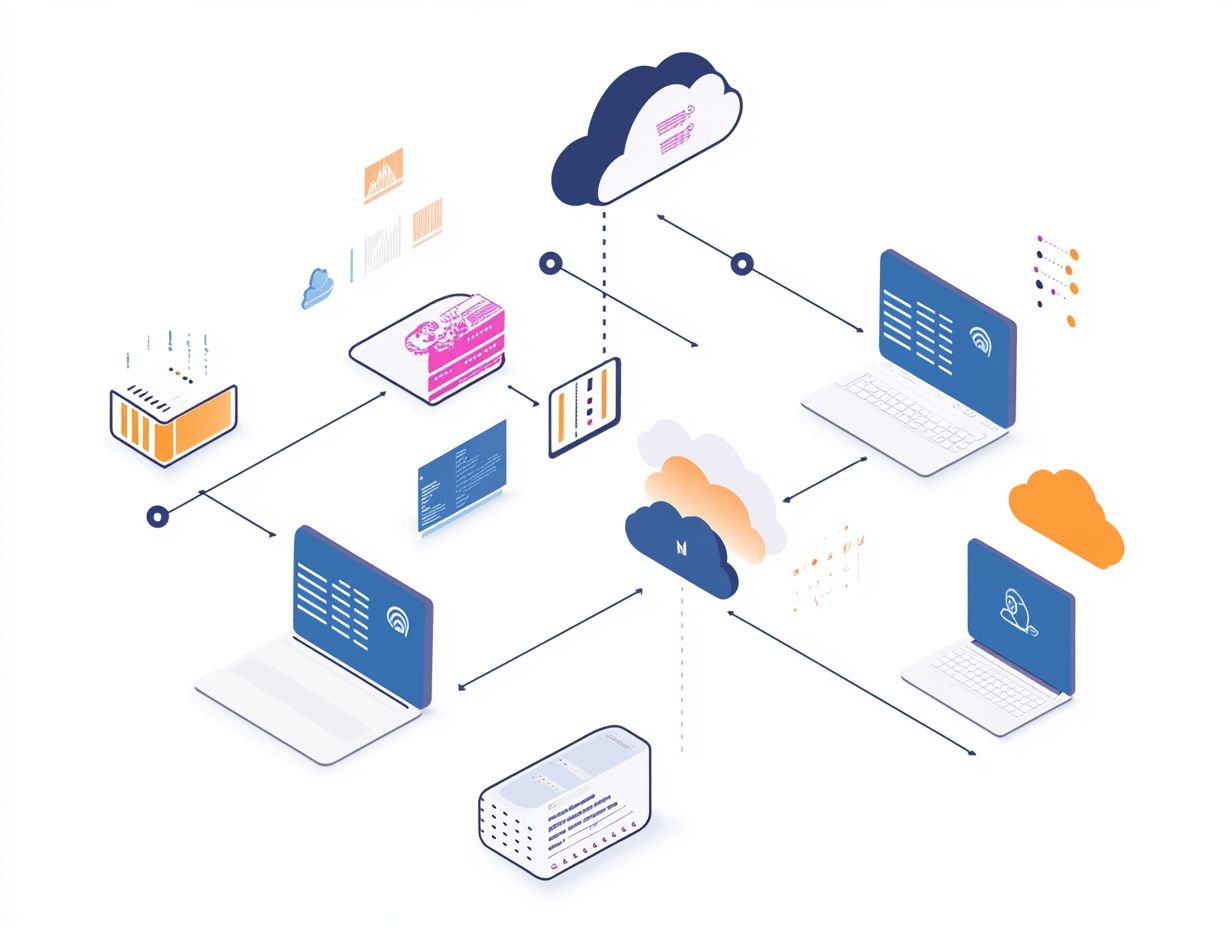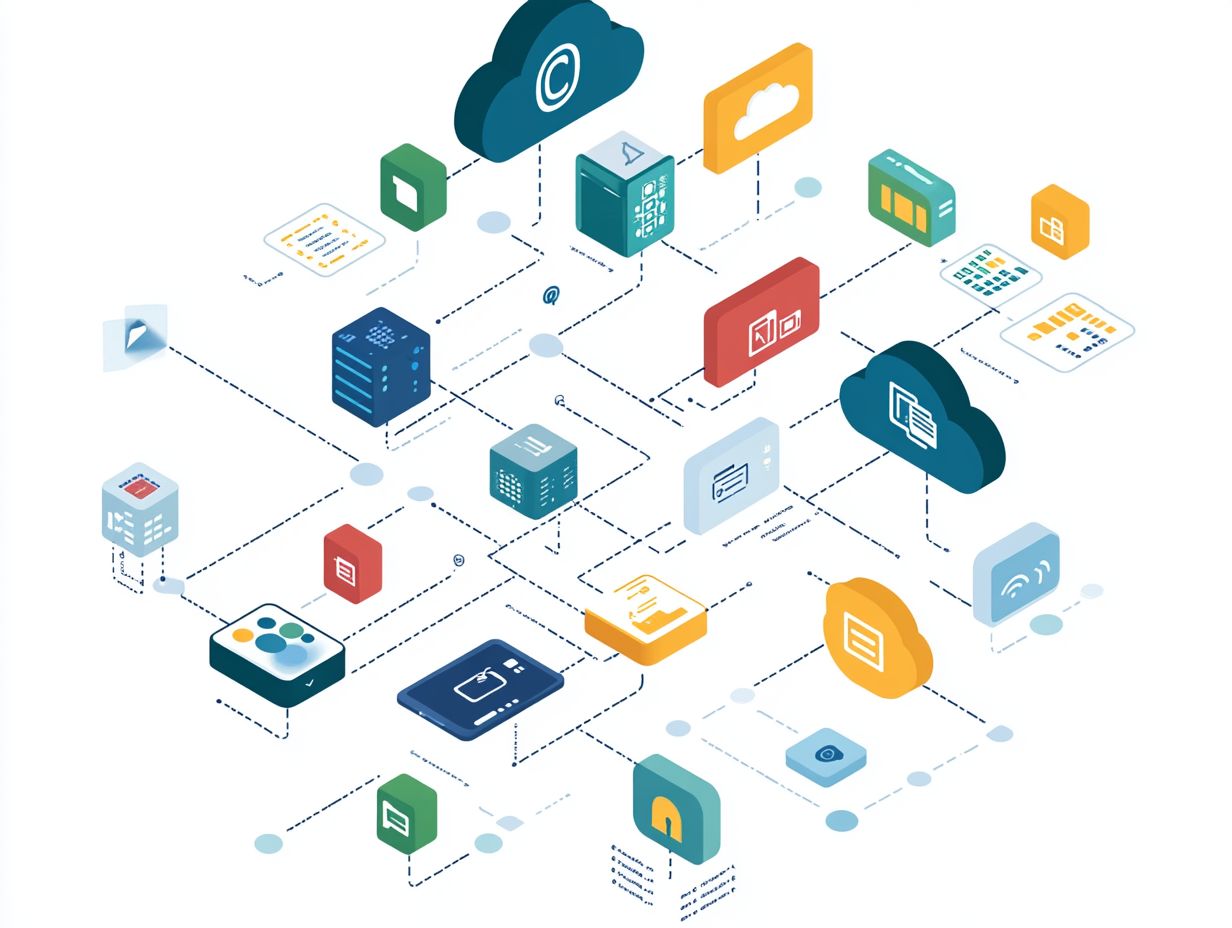The Role of APIs in Cloud Migration
Cloud migration is a pivotal strategy for you if you’re looking to enhance scalability, reduce costs, and improve overall efficiency in your business.
As you transition to the cloud, grasping the role of APIs (which allow different software to communicate) becomes essential. APIs not only streamline your migration process but also unlock a wealth of benefits, from increased flexibility to heightened efficiency.
However, integrating APIs into your cloud migration journey does come with its own set of challenges. This article will delve into the significance of APIs in cloud migration, the advantages they present, and best practices to navigate potential hurdles.
Join us to explore the future of cloud migration with APIs leading the way!
Contents
- Key Takeaways:
- Understanding Cloud Migration
- The Role of APIs in Cloud Migration
- Benefits of Using APIs in Cloud Migration
- Challenges of API Integration in Cloud Migration
- Best Practices for API Integration in Cloud Migration
- Future of APIs in Cloud Migration
- Frequently Asked Questions
- Why Should You Care About APIs in Cloud Migration?
- Why Are APIs Important in Cloud Migration?
- What Benefits Do APIs Offer in Cloud Migration?
- Can APIs Be Used for Both Public and Private Cloud Migration?
- Do APIs Play a Role in Hybrid Cloud Migration?
- How Can APIs Help in the Management and Monitoring of Cloud Migration?
Key Takeaways:

- APIs are vital for cloud migration efficiency.
- Your organization can overcome integration challenges with careful planning.
- Stay updated on API technology for future advancements.
Understanding Cloud Migration
Cloud migration is the process of shifting your data, applications, and other business components from on-premises infrastructure to cloud-based systems, or even between different cloud environments.
This transition might mean moving existing applications to cloud-friendly systems. It may also involve modernizing outdated systems to boost scalability and efficiency.
As businesses increasingly embrace cloud computing, grasping the importance of cloud migration is essential for optimizing operational workflows, cutting costs, and ensuring data portability across platforms like AWS, Azure, and other cloud services.
This not only facilitates seamless integration with tools like Google Maps and Salesforce but also positions you well for future growth.
Definition and Importance
Cloud migration is the strategic journey of moving your data and applications from local servers to the cloud, allowing you to fully leverage the advantages of cloud computing.
In today s fast-paced digital environment, this transition is crucial for any organization striving to remain competitive and agile. By embracing cloud migration, you can significantly enhance your data integration capabilities.
This ensures seamless access to information across various platforms and departments. The automation opportunities presented by the cloud streamline workflows and minimize manual tasks, freeing up valuable resources for more strategic initiatives.
By utilizing cloud-native applications, you can achieve improved operational efficiency. This enables your business to rapidly adapt to changing market demands while maximizing resource allocation.
The Role of APIs in Cloud Migration
APIs are essential to your cloud migration strategy. They enable seamless interactions between various software applications, ensuring effective data sharing and supporting the development of microservices architectures. Understanding the role of automation in cloud migration can further enhance this process.
Embracing APIs allows you to streamline processes and enhance the overall efficiency of your systems.
How APIs Facilitate the Process
APIs play a crucial role in facilitating your cloud migration processes by providing robust solutions that support data integration and cloud management. For more insight, explore the role of APIs in cloud storage, which ultimately allows you to automate critical workflows.
For instance, you can leverage specific APIs to automate data transfers between your on-premise systems and the cloud, significantly cutting down the time and effort required for manual uploads.
In terms of migrating applications, cross-platform APIs effortlessly integrate various cloud services, ensuring that your systems communicate effectively. This kind of interoperability is essential, particularly if you re adopting a multi-cloud strategy, as it enhances your existing solutions without sacrificing performance.
APIs simplify your migration workflows by eliminating redundant tasks. This frees up your teams to concentrate on optimizing resources and ensuring a seamless transition to cloud-based environments.
Benefits of Using APIs in Cloud Migration

Using APIs during cloud migration offers a host of advantages that significantly elevate your experience. You’ll enjoy enhanced efficiency.
Gain increased flexibility in application deployment and achieve superior performance optimization for your cloud-native applications.
Efficiency and Flexibility
APIs serve as a cornerstone for enhancing efficiency and flexibility during your cloud migration, particularly by playing a crucial role in IaaS solutions, empowering you with flexible cloud setups and supporting your application modernization initiatives.
By streamlining data exchange between various software systems, APIs enable you to seamlessly integrate your existing applications with cloud services. This integration becomes crucial as you strive to scale operations without sacrificing performance.
The flexibility that APIs offer allows your teams to adapt to evolving business needs with minimal disruption. As you modernize your software, you can deploy new features swiftly and respond to market demands more rapidly, effectively transforming your technological landscape and boosting overall agility in an increasingly competitive environment.
Challenges of API Integration in Cloud Migration
Integrating APIs during cloud migration offers numerous advantages, yet it also brings forth a host of challenges for you to consider.
You’ll need to address security protocols, navigate compatibility issues with various data formats, and tackle obstacles that can arise during implementation.
Common Obstacles and Solutions
When navigating API integration during cloud migration, you may encounter several common obstacles, such as complexities in data sharing, inadequate API documentation, and varying security requirements across platforms.
These challenges often cause delays and errors, making it essential for your team to identify potential bottlenecks early in the process. For instance, if data formats differ across systems, miscommunication and data loss may occur.
To mitigate this, use standard formats like JSON or XML to promote consistency. If you find yourself grappling with poor documentation, don t hesitate to seek clarity. Engage with vendors or tap into community forums to gather more comprehensive insights.
Addressing security discrepancies can be streamlined by establishing a unified security framework that aligns with all involved platforms, ensuring seamless communication without compromising data integrity.
Best Practices for API Integration in Cloud Migration
Implementing best practices for API integration during your cloud migration is crucial for success! This approach ensures a seamless flow of data, promotes agile development, and establishes a flexible architecture that can easily adapt to evolving business needs.
Key Considerations and Tips

When you’re planning for API integration during cloud migration, there are a few key considerations to keep in mind. First, you’ll want to select the right API management strategy, ensure performance optimization, and align your integration strategies with your overarching business objectives.
Begin by conducting a thorough assessment of your current infrastructure and future needs to pinpoint which APIs are essential for your success. This involves not just technical evaluations, but also a clear understanding of how these APIs contribute value to your business.
Maintaining open communication with stakeholders throughout this process is crucial; it ensures that the integration aligns with vital enterprise goals.
Best practices for API management should prioritize security, scalability, and ease of use, enabling your teams to adapt swiftly to shifts in business requirements or emerging technology trends. This approach ultimately leads to a more seamless migration and enhances overall operational efficiency.
Future of APIs in Cloud Migration
The future of APIs in cloud migration is brimming with potential, as you can anticipate a surge in the adoption of innovative API solutions.
These advancements are set to significantly enhance interoperability, bolster security, and improve overall efficiency within cloud environments.
Predictions and Potential Developments
Predictions about the evolution of APIs in cloud migration point to a promising shift toward more advanced API solutions that emphasize a way to organize software into smaller parts and automation.
These API advancements will streamline your transitions to the cloud.
Automation is key! It will cut down your workload and let you focus on innovative projects rather than getting bogged down by repetitive tasks.
Enhanced security measures are crucial in safeguarding sensitive data during migrations, ensuring you maintain compliance with industry standards.
By embracing improved support for microservices, your business can establish a more modular framework, allowing for swift adaptation to changing demands and seamless scaling of services. This proactive approach will ultimately reshape the cloud computing landscape in your favor.
Frequently Asked Questions
Why Should You Care About APIs in Cloud Migration?
API stands for Application Programming Interface, which is a set of protocols, definitions, and tools for building software and applications. APIs play a crucial role in cloud migration as they facilitate communication and data exchange between different systems and applications in a cloud environment.
Why Are APIs Important in Cloud Migration?
APIs are essential in cloud migration as they provide a standardized and efficient way of integrating various applications, data, and systems in the cloud. Understanding the role of DevOps in cloud migration can also simplify the connection and migration of legacy systems to the cloud, reducing complexity and costs.
What Benefits Do APIs Offer in Cloud Migration?
APIs offer seamless integration of applications and systems, improved data access and exchange, enhanced security and scalability, and increased flexibility and agility in the cloud environment.
Can APIs Be Used for Both Public and Private Cloud Migration?
Yes, APIs can be used for both public and private cloud migration. They provide a standardized method for connecting and integrating various applications and systems, regardless of the type of cloud environment.
Do APIs Play a Role in Hybrid Cloud Migration?
Yes, APIs are crucial in hybrid cloud migration as they enable communication and data exchange between different cloud environments and traditional on-premise systems. This allows for seamless integration of data and applications across the hybrid cloud environment.
How Can APIs Help in the Management and Monitoring of Cloud Migration?
APIs can help manage and monitor cloud migration by providing real-time access to data and metrics related to the process. Understanding the role of project management in cloud migration can also streamline tasks, making it easier to track and manage migration progress.
Ready to start your cloud migration journey? Let s explore how APIs can help!







